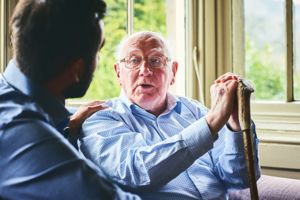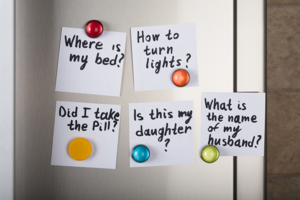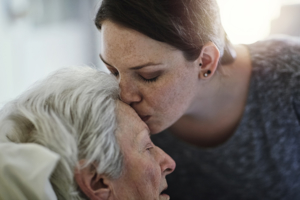Paranoia in the Elderly: What to Do When Dad Seems Irrational

It surprises some to learn that paranoia in the elderly is a common issue. Learn more about how to respond to an aging parent that may be acting irrational.
“Listen to me, there’s a dog inside my closet! I hear it growling all night long. We need to find its owner!”
Hearing a senior loved one voice worries that you know to be false is unsettling – but not abnormal. The initial impulse may be to try to rationalize with the individual with a response such as, “Nonsense! There’s absolutely no way a dog could have gotten into your closet!” Yet for various reasons, this is often the least successful solution to take care of paranoia in the elderly.
Instead, at Responsive Home Care, we encourage the following approaches in order to help restore a sense of calm and well-being:
- First and foremost, arrange an appointment with the senior’s physician. It is vital that you discover any cognitive problems in order to be certain he or she receives appropriate treatment if needed. There also could be prescription side effects at play.
- Find out the thinking associated with the irrationality, and then determine how to remedy the situation. For example, perhaps the heating and cooling vent near the closet is starting to become loose, or an air vent is blowing onto a row of hangers and leading to an unusual sound.
- In lieu of trying to correct the senior loved one, respond lovingly with assurance and empathy. Concentrate on accepting the feelings being conveyed, as well as on having the person know that you will be there to help. Accompanying the senior into another area and providing interesting distractions, such as listening to music, baking, gardening, or browsing through photos together, can help restore calm.
- One of the smartest ways to overcome any obstacle is as simple as finding out what has assisted others in the same situation. Think about joining an in-person or online community of family caregivers, allowing for the exchange of helpful knowledge and information. A number of choices are available, such as AgingCare.com’s caregiver discussion forum.
- Seek the support of a professional home care provider, such as Responsive Home Care providing home health care in Pembroke Pines and the surrounding area. Our caregivers are skilled at assisting the elderly to remain active and involved, and in helping to ease challenging and difficult behaviors. Partnering with an established and reliable caregiver also will provide you with much-needed respite to take a break from caregiving duties while being confident your loved one is receiving top quality care.
For more advice on helping your senior loved one through obstacles with growing older, dementia or chronic illness, reach out to the specialists in home health care in Pembroke Pines and the surrounding area at Responsive Home Care. We are always readily available to answer any questions, share resources specific to the challenges you are encountering, and to provide a free in-home consultation and development of a customized care plan to improve wellbeing for a senior loved one. Contact us any time at 954-486-6440.






 Spending time outside of the house with an elder who has dementia can be both frustrating and challenging. If they are in the later stages of the disease, you may have to worry about the elder wandering or displaying abnormal behaviors. While it can be terrifying and possibly embarrassing to even consider going out in public with your loved one, it is something you and the elder should do from time to time.
Spending time outside of the house with an elder who has dementia can be both frustrating and challenging. If they are in the later stages of the disease, you may have to worry about the elder wandering or displaying abnormal behaviors. While it can be terrifying and possibly embarrassing to even consider going out in public with your loved one, it is something you and the elder should do from time to time. When you first start to notice your loved one having difficulty processing information, it’s scary. The situation can be scary for your elderly loved one, too, because cognitive issues can often mean that she’s about to lose some of her independence.
When you first start to notice your loved one having difficulty processing information, it’s scary. The situation can be scary for your elderly loved one, too, because cognitive issues can often mean that she’s about to lose some of her independence. If your elderly loved one has dementia and is refusing to bathe regularly, you may find yourself frustrated by the problem. This is unfortunately common for loved ones who have dementia, but the situation is still resolvable.
If your elderly loved one has dementia and is refusing to bathe regularly, you may find yourself frustrated by the problem. This is unfortunately common for loved ones who have dementia, but the situation is still resolvable.